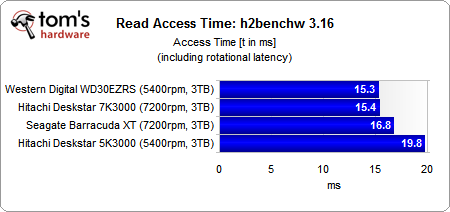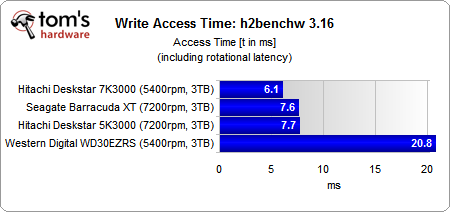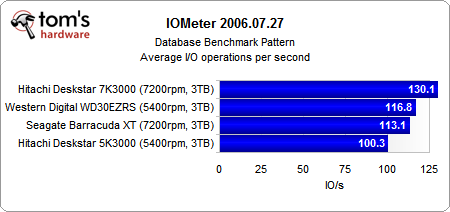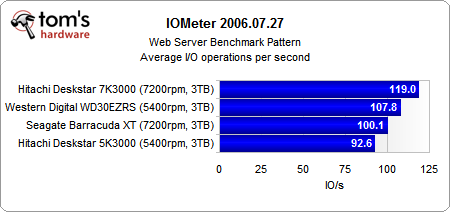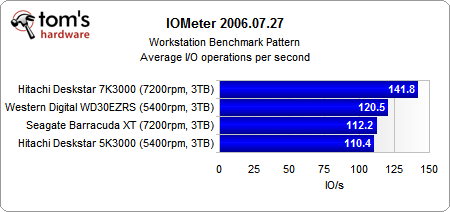Four 3 TB Hard Drives, Tested And Reviewed
Hard drives able to hold 3 TB of data need to be considered carefully because they might not always work as expected. This round-up of four high-capacity disks compares products from Hitachi, Seagate, and Western Digital, then covers their caveats.
Benchmark Results: Access Time And I/O Performance
The low-level h2benchw benchmark directly accesses the hard disk, ignoring existing sector alignments through the operating system. That's particularly interesting in this case, because all of the test candidates work with 4 KB sectors, masquerading as 512-byte sectors for the OS. The results are surprising because, while the Seagate Barracuda XT and Hitachi Deskstar 7K3000 run at a much higher speed, they occupy the top positions in write speeds and not read speeds.
The test candidates are not designed for file operations that occur in a database, a Web server, or a workstation. Thus, the supposedly-fast 7200 RPM drives are sometimes in front of and sometimes in the middle of the competition, a far cry from a clear victory.
Get Tom's Hardware's best news and in-depth reviews, straight to your inbox.
Current page: Benchmark Results: Access Time And I/O Performance
Prev Page Benchmark Results: 4 KB Random Reads/Writes And Streaming Reads/Writes Next Page Benchmark Results: PCMark Application Performance-
agnickolov ReplyThree terabyte hard drives remain premium products, not only because they're best handled by enthusiasts who know what they're doing, but also because they're the largest disks available and you always seem to pay more for the largest, fastest, coolest...well, you know the drill.
Well, that's no longer the case:
http://www.tomshardware.com/news/GoFlex-Desk-4TB-3.5-inch-industrial-design-USB-3.0,13371.html
-
vdr369 Seagate barracuda is pulling my heart with it's performance, but punching my pocket with it's price,Reply -
salb99 the hitachi 5k3000 at max throughput uses less power than at idle, is it correct? also, video power consumptions here are the same as idle for all drives.Reply -
dww I don't see the point of 3 TB drives. Too big to use in most current systems, but too small to be a useful gain over 2 TB for those that CAN handle larger sizes. At present they're also too expensive, and once 4 TB drives come out in volume they'll be superseded. So I guess they're just a short term stopgap.Reply -
excidium Graph labels for the 7K3000 are incorrect ( 5400RPM ) on page:Reply
Benchmark Results: Throughput And Interface Bandwidth
Haven't finished reading the rest of the article. -
WD30EZRS recommended for NAS?Reply
how about TLER ? and the issue with frequent head parking ? Though the later is correctable with wdidle3.exe..
Considering each green drive might have different rotation speed are you sure about your NAS recommendation? -
monkeysweat i know 2TB is cheaper per GB,, however i only got 4 HDD slots in my case,, and 3 are in use already,, 1.5, 2.0 & 2.5 TB model drives + 1 SSD tucked under my card reader,, either i gotta spend more on a new case + drive or just spend a little more on a nice drive...Reply -
chesteracorgi With 2 Samsung 2.0 TB F4 Ecogreen (SATA 3.0 & 32 MB cache) and 2 1.5 TB Seagate Barracuda Green (SATA 6.0 & 64 MB cache) drives installed in my home server, it is my experience that HDDs are no better off on SATA 6.0 than on SATA 3.0. If you are looking for performance then look for a faster rpm rate: the 640 GB WD Caviar Black (SATA 6.0 & 64 MB cache) kills all of the above in speed. However, none of these HDDs can touch an older generation SSD like the Crucial C300 (128 GB).Reply
The most important characteristic of the HDDs is reliability. So far, since 3/11, all of the HDDs have proven reliable, while the SSD had to be RMA'd after a couple of weeks.
But the story is not complete on any of this hardware as it is still premature to talk about long term results. I believe that reliability is the biggest issue with 3 TB drives and would like to see more on failure rates and reliability.
BTW the average feedback at Newegg on large HDDs is about 60% positive (4 or 5 eggs) on large drives. I made a decision to buy only drives with a rating of at least 80% aggregate positive.
